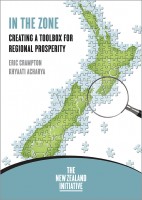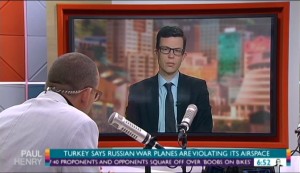
In the Zone: Creating a Toolbox for Regional Prosperity
"Different strokes for different folks". So goes that famed line from Sly & The Family Stone’s 1969 hit, Everyday People. Read more

Eric Crampton is Chief Economist with the New Zealand Initiative.
He applies an economist’s lens to a broad range of policy areas, from devolution and housing policy to student loans and environmental policy. He served on Minister Twyford’s Urban Land Markets Research Group and on Minister Bishop’s Housing Economic Advisory Group.
Most recently, he has been looking at devolution to First Nations in Canada.
He is a regular columnist with Stuff and with Newsroom; his economic and policy commentary appears across most media outlets. He can also be found on Twitter at @ericcrampton.
Phone: +64 4 499 0790

"Different strokes for different folks". So goes that famed line from Sly & The Family Stone’s 1969 hit, Everyday People. Read more

Dr Eric Crampton, Head of Research at The New Zealand Initiative, discusses compensation for live organ donors on The Paul Henry Show on Wednesday 7 October 2015. Read more
Dr Eric Crampton discusses the TPPA with Mark Sainsbury on RadioLIVE Read more
Dr Eric Crampton on Radio NZ Sunday Roundtable: The state of immigration in New Zealand Read more
Since the third position here at Insights is usually reserved for a light-hearted take on the events of the day, let me play devil’s advocate, taking the opposite side to two of Oliver’s recent arguments. Oliver is almost certainly correct, and if the Initiative has a position on anything, it is his. Read more
If there is one overarching theme in the Department of Internal Affairs’ report on loopy regulations, released this week, it is that our regulations have become so complicated that nobody really knows what the rules are any more. The Rules Reduction Taskforce set out last year to collect examples of “loopy” regulations in need of updating. Read more
Dr Eric Crampton joins Rachel Smalley to discuss the notion of preferential voting and how people can vote strategically in the referendum.
PLAY AUDIO Read more
It’s a rare day I do not pass by one of Wellington’s many bucket collectors. On my morning walk from the train station through to Lambton Quay, it’s more common to see at least three or four of them than to see none. Read more
When Cal Tech economist D. Roderick Kiewiet looked hard at the stack of American regulations affecting health and safety, he found a mess. Read more
It is really hard not to sympathise with calls for increasing the refugee quota. Seeing the pictures from the Mediterranean tugs at the heartstrings. Read more
We this week released Elisabeth Prasad's report running some of the numbers on whether compensating live kidney donors makes sense. She finds that the typical kidney transplant saves the Ministry of Health on net about $125,000 over the longer term: dialysis is expensive. Read more
Australia National University’s Dr. George Barker suggested that New Zealand could do well by strengthening its copyright legislation. He warned against the fair dealing exceptions that have crept into the law and asked, “Why not have copyright law like property law—i.e. Read more
The most important norm in economics was set by economist Vilfredo Pareto about a century ago. Put simply, the Pareto Criterion says that anything making at least one person better off, while making nobody else worse off, is desirable. Read more
There are not too many policies that can save and improve lives while saving the government money, but Chris Bishop’s member’s bill providing greater compensation to live organ donors may be one. Late Wednesday evening, Parliament voted that Bishop’s member’s bill should proceed to committee. Read more
The rationales of individual freedom and personal responsibility with Eric Crampton, head of research at The New Zealand Initiative. Tonight, the economics around organ donation and sale. Read more